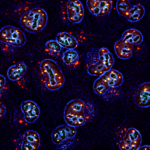Link to Pubmed [PMID] – 10233977
J. Virol. 1999 Jun;73(6):5137-43
PML nuclear bodies (NBs) are subnuclear structures whose integrity is compromised in certain human diseases, including leukemia and neurodegenerative disorders. Infection by a number of DNA viruses similarly triggers the reorganization of these structures, suggesting an important role for the NBs in the viral infection process. While expression of the adenovirus E4 ORF3 protein leads to only a moderate redistribution of PML to filamentous structures, the herpes simplex virus (HSV) ICP0 protein and the cytomegalovirus (CMV) IE1 protein both induce a complete disruption of the NB structure. Recently, we and others have shown that the NB proteins PML and Sp100 are posttranslationally modified by covalent linkage with the ubiquitin-related SUMO-1 protein and that this modification may promote the assembly of these structures. Here we show that the HSV ICP0 and CMV IE1 proteins specifically abrogate the SUMO-1 modification of PML and Sp100, whereas the adenovirus E4 ORF3 protein does not affect this process. The potential of ICP0 and IE1 to alter SUMO-1 modification is directly linked to their capacity to disassemble NBs, thus strengthening the role for SUMO-1 conjugation in maintenance of the structural integrity of the NBs. This observation supports a model in which ICP0 and IE1 disrupt the NBs either by preventing the formation or by degrading of the SUMO-1-modified PML and Sp100 protein species. Finally, we show that the IE1 protein itself is a substrate for SUMO-1 modification, thus representing the first viral protein found to undergo this new type of posttranslational modification.

